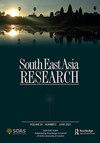克里奥尔语与国家建构技术:民族主义理论家尼克·华金
IF 0.9
3区 社会学
0 ASIAN STUDIES
引用次数: 0
摘要
摘要本文将菲律宾小说家尼克·华金的历史作品与本尼迪克特·安德森的《想象的社区》进行比较。它认为华金在大致同一时期发展出了与安德森相当的思想。华金和安德森一样,将现代民族主义的起源追溯到克里奥尔人(出生在殖民地的欧洲人),并将民族主义视为技术变革的产物。通过将华金的作品与二十世纪最重要的历史著作之一进行比较,本文认为华金是一位重要的民族主义理论家。本文章由计算机程序翻译,如有差异,请以英文原文为准。
On creoles and technologies of nation-making: Nick Joaquin as a theorist of nationalism
ABSTRACT This article compares the historical work of Filipino fictionist Nick Joaquin with Benedict Anderson’s Imagined Communities. It contends that Joaquin developed ideas comparable to Anderson’s roughly the same time. Joaquin, like Anderson, traces the origins of modern nationalism to creoles (Europeans born in the colonies) and views nationalism as a product of technological change. In comparing Joaquin’s work with one of the twentieth century’s most important historical works, this article makes a case for Joaquin as an important theorist of nationalism.
求助全文
通过发布文献求助,成功后即可免费获取论文全文。
去求助
来源期刊

South East Asia Research
ASIAN STUDIES-
CiteScore
1.90
自引率
0.00%
发文量
42
期刊介绍:
Published three times per year by IP Publishing on behalf of SOAS (increasing to quarterly in 2010), South East Asia Research includes papers on all aspects of South East Asia within the disciplines of archaeology, art history, economics, geography, history, language and literature, law, music, political science, social anthropology and religious studies. Papers are based on original research or field work.
 求助内容:
求助内容: 应助结果提醒方式:
应助结果提醒方式:


